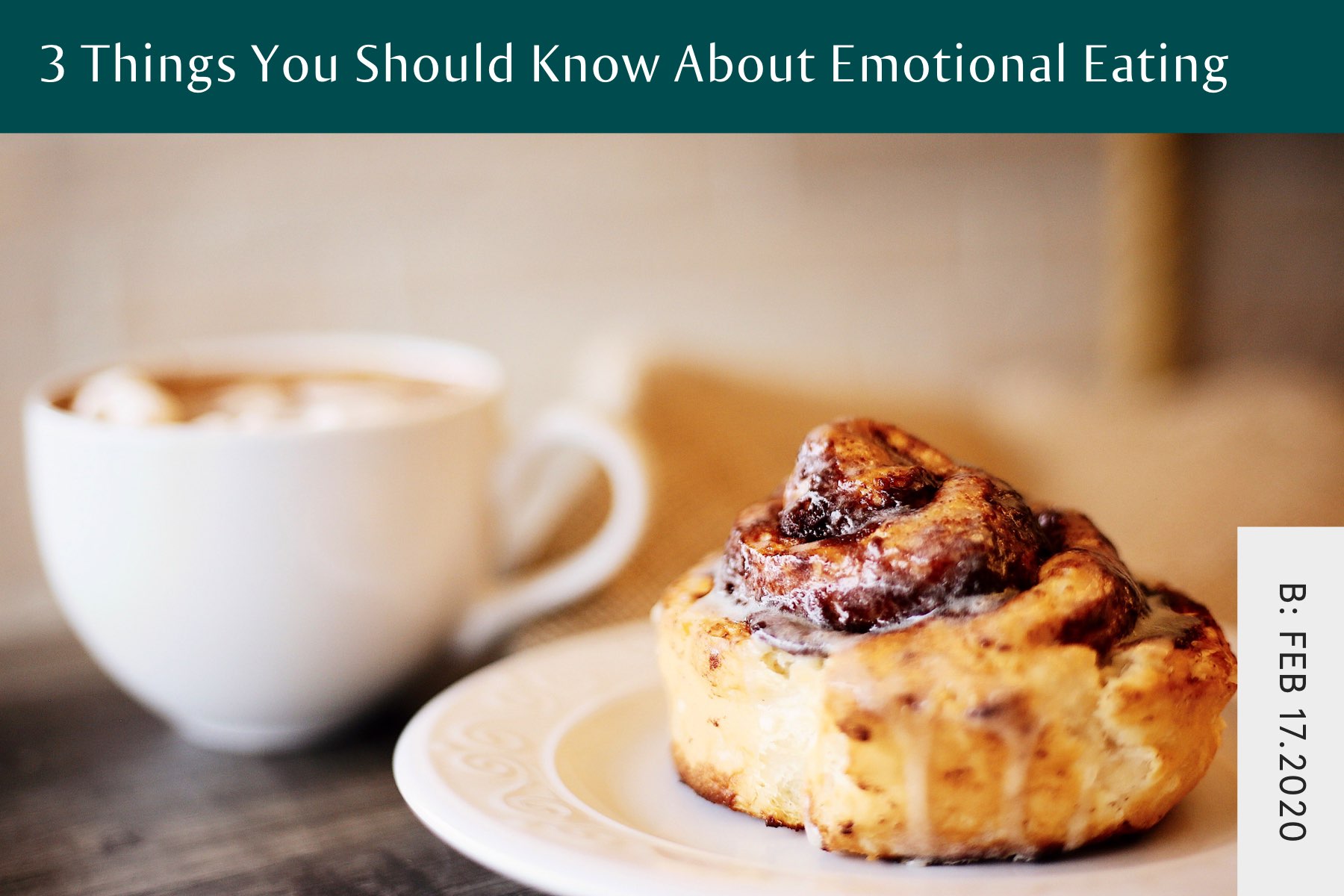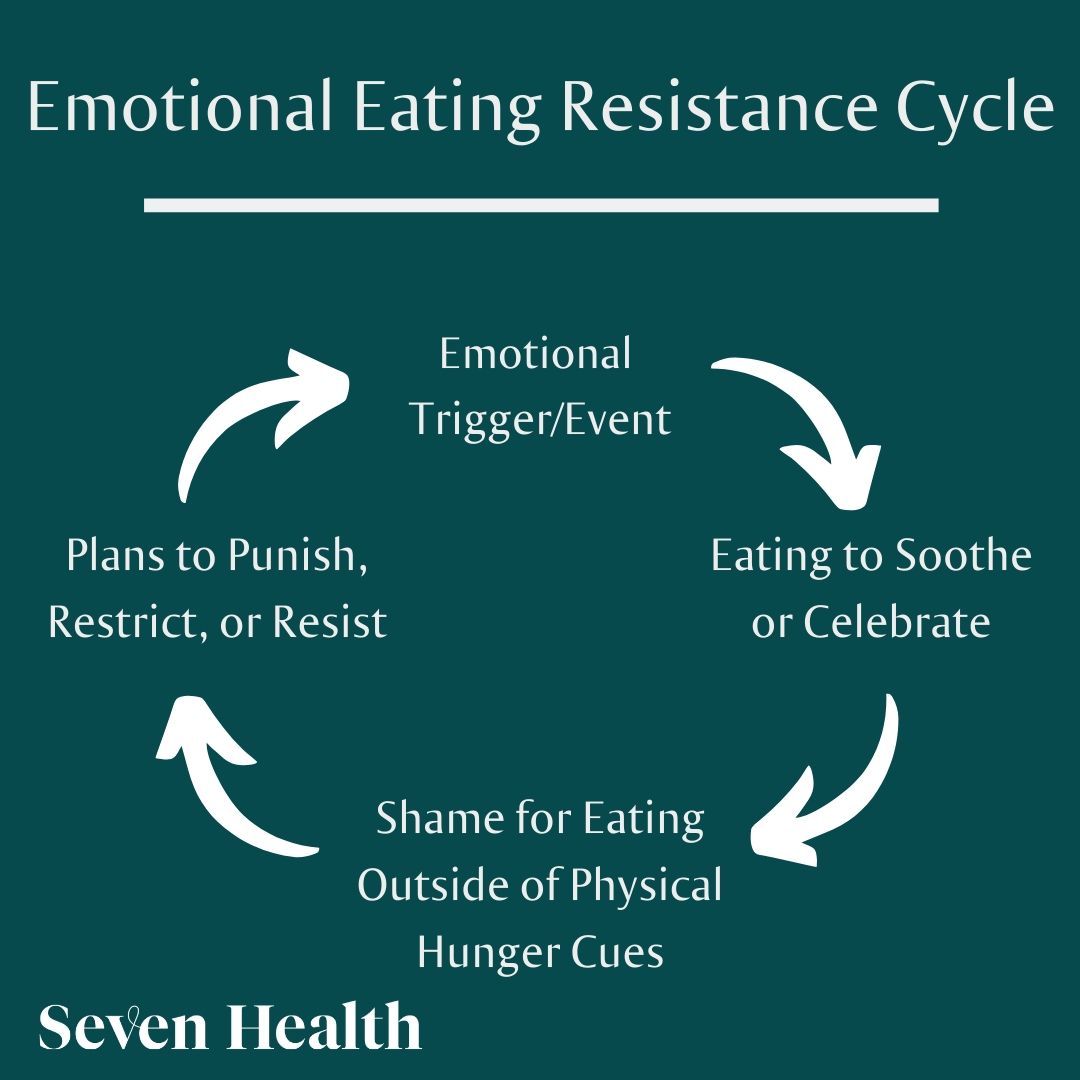

Thirteen years ago, I miscarried. It was an early April morning; the sky still dark and sunless.
I’ll save you the gut-wrenching details and simply say that the experience was excruciating, both physically and emotionally.
On my doctor’s advice, I attempted to rest before meeting him at the hospital for the start of his shift. But I couldn’t sleep. And neither could my husband.
So, he called our best friends, and within minutes they were standing in our bedroom with tears in their eyes, open arms, and a tray full of cinnamon rolls. The four of us passed the time until my appointment crying together and eating warm, sweet pastries in bed.
And while sympathy cinnamon rolls didn’t heal my heartache, they did temper it with comfort, care, and compassion.
In that dreadful moment, emotional eating was a welcomed gift.
Emotional eating is the act of consuming food to soothe, avoid, or emphasise feelings – often in the absence of biological hunger or nutritional need.
It’s a coping mechanism. And though our diet-obsessed culture vilifies and pathologises it, “eating your feelings” is a relatively harmless behaviour.
Despite its bad reputation, emotional eating can be a valid and beneficial self-care tool.
Here are three things you should know about it.
When you’re stressed, the body takes notice and works to respond to your emotional state through hormonal shifts. In the short term, emotional upset might lead to a decline in appetite thanks to the release of a hunger-suppressing hormone called epinephrine (adrenaline).
But, when anxiety persists, appetite tends to increase along with elevated cortisol levels. Add a history of dieting and disordered eating to the mix, and the biological inclination to eat in response to stress only intensifies.
Meaning it’s completely natural to want to chow down when things go wrong.
Sure, sometimes, hunger is emotionally motivated. But that doesn’t mean it’s not also physiologically appropriate. When you’re sad, worried, or angry, your body seeks out the energy required to resolve your problems.
In this way, consuming food is often a primal survival mechanism that hopefully ends with you moving on from your stress-induced snack with the sustenance you need to find a solution.
Emotional eating is a bodily norm. And it’s culturally prevalent too.
Food is celebratory, comforting, communal, ceremonial, and sacred.
Just consider these familiar reasons for eating in the absence of physical hunger cues:
Emotional eating is part of the human experience.
There’s absolutely nothing wrong with using food to enhance positive life moments or soften negative ones.
It’s normal. And so are you.
Just like tv watching, kickboxing, book reading, or diving into a major project – emotional eating is a rather benign coping mechanism that offers temporary relief and distraction from your feelings.
While it won’t do anything to change your situation, it can momentarily quiet your mind and alert you to emotions and circumstances that require your eventual attention.
In this way, emotional eating is a signal. It’s your subconscious mind communicating through behavior that something – at work, at home, in friendship, in relationship, in your environment, or in society – isn’t working.
And, if you’re willing to take notice, it can be the catalyst you need to reflect on and constructively respond to what troubles you.
Of course, the diet industry is quick to criticize the act of eating food to feel better, and much of mainstream “wellness” culture is devoted to teaching you how to prevent it. These communities have so closely tied eating (or lack thereof) to weight manipulation. And since they conflate weight manipulation with worthiness, they refuse to see the value in seeking solace from discomfort through food.
But, if throwing back a milkshake and fries gives you the relief you need to perform daily tasks amid personal distress – what’s the big deal?
Stress-eating, in the context of a diverse and healthy coping progression, is a useful self-care tool that can serve to minimize harm to yourself and others. Unlike restriction, purging, drug and alcohol abuse, self-mutilation, excessive exercise, overspending, or violence, the impact of eating outside of physical hunger is nominal.
And the utility of such food experiences, when understood as tangible invitations to define and address undesirable life circumstances and be present and responsive to the emotions surrounding them, is quite constructive.
In other words, emotional eating is innocent. It offers gentle opportunities to investigate your life and make positive changes toward your peace and happiness. When practiced without guilt, it can be a loving act of compassion, acceptance, and care.
That doesn’t seem so “sinful,” does it?
As you may already know, resistance, restriction, and judgment around food increase mental and physical stress and exacerbate reactionary eating experiences.
Thus, trying to prevent (or prematurely end) moments of emotional eating only serves to perpetuate them in a cycle that goes something like this:

First, you experience an emotional trigger or event. That experience leads to eating in an effort to soothe or celebrate your feelings. Next, you encounter nagging thoughts of shame for eating outside of physical hunger and make plans to punish your body with compensatory exercise or restriction, all the while urging yourself to resist further coping with food. This process creates its own emotional and physiological trigger, and the cycle repeats.
Inevitably, fighting the urge to “eat your feelings” keeps you focused on the arbitrary “problem” of emotional eating and perpetuates a pattern of shame-fueled avoidance. Plus, it does nothing to address the very real experiences that led you to food in the first place.
That’s because emotional eating resistance takes what could have been a brief and harmless distraction from processing difficult feelings and channels it towards further reactionary eating experiences that ignore the true roots of your discomfort.
By spending all of your energy struggling against the consumption of food to cope with emotions, you only compound the distress, preventing the transition to more productive coping mechanisms. Coping mechanisms that encourage the exploration and resolution of your problem.
Consider allowing yourself to eat emotionally while also prioritising more expressive and effective coping strategies. This might look like eating a donut (temporary relief) while also calling your best friend, making an appointment with your therapist, journaling, or otherwise processing your feelings towards a more permanent fix. In doing so, you’ll neutralize the food experience and relegate emotional eating to one small component of your self-care toolbox rather than the primary activity.
You never have to resist emotional eating.
Because, it’s not actually a problem.
What’s problematic is the fear and guilt around eating outside of physical hunger or necessity. That’s what ultimately leads to reactionary binges and the perpetual suppression of feelings, never the food itself.
___
Are you someone who regularly uses food to deal with difficult emotions (restricting it or consuming it)? If you want compassionate, professional support in understanding these eating behaviours, diversifying coping mechanisms, and addressing underlying emotions and experiences – the Seven Health team can help.
I’m a leading expert and advocate for full recovery. I’ve been working with clients for over 15 years and understand what needs to happen to recover.
I truly believe that you can reach a place where the eating disorder is a thing of the past and I want to help you get there. If you want to fully recover and drastically increase the quality of your life, I’d love to help.
Want to get a FREE online course created specifically for those wanting full recovery? Discover the first 5 steps to take in your eating disorder recovery. This course shows you how to take action and the exact step-by-step process. To get instant access, click the button below.
What an excellent article! Thank you! Your posts are so helpful and reassuring.
So glad it resonated with you!
[…] Originally posted at Seven Health, HERE. […]